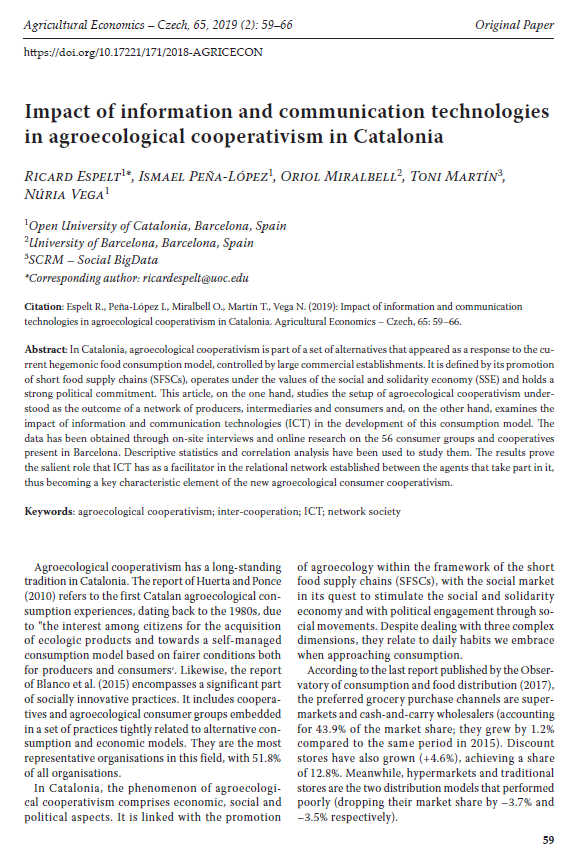
Impact of information and communication technologies in agroecological cooperativism in Catalonia
In June 2016 four friends gathered around a table. Ricard was working on his PhD thesis, which I supervised, and summoned the help of a data expert, Toni, and someone knowledgeable on analysing networks of people, Oriol — later on Núria Vega would join the team to improve the whole project and, specifically, bring brains and muscle to the field work.
At that time we believed that ICTs were having an impact on agriculture and people working in agroecology and cooperatives. But we suspected that there was something else. In Catalonia, cooperatives were changing the shape of the agriculture sector in the XIX century. After a long hiatus during the Spanish dictatorship (1939-1978), the agriculture cooperative sector (with quite republican ideas attached) kept on being dormant… until the breakout of the World Wide Web in the mid 1990s.
That was more than a coincidence to us, so we decided to analyze it — it was Ricard’s idea: the rest just followed. But soon we saw that there seemed to be much more than just a rebirth of cooperatives: what was being deployed before our eyes was something new. Beyond using ICTs to improve management and/or make sustainable non-mainstream models that can barely compete with the big behemoths of the food industry, what we saw whas that ICTs seem to be configuring a brand new ecosystem of food production and consumption, including new ways to understand food as a public infrastructure.
Almost three years after comes this article of us, with these reflections formerly put and rigorously analyzed. The result is Impact of information and communication technologies in agroecological cooperativism in Catalonia, just published at Agricultural Economics (AGRICECON).
While we waited for the paper to be published, Oriol left us forever. As we stated in the paper, Oriol, it was fun working with you while you were among us. Now you are gone, but the good work remains. So long, friend. Ricard, Ismael, Núria and Toni.
Article abstract and download
In Catalonia, agroecological cooperativism is part of a set of alternatives that appeared as a response to the current hegemonic food consumption model, controlled by large commercial establishments. It is defined by its promotion of short food supply chains (SFSCs), operates under the values of the social and solidarity economy (SSE) and holds a strong political commitment. This article, on the one hand, studies the setup of agroecological cooperativism understood as the outcome of a network of producers, intermediaries and consumers and, on the other hand, examines the impact of information and communication technologies (ICT) in the development of this consumption model. The data has been obtained through on-site interviews and online research on the 56 consumer groups and cooperatives present in Barcelona. Descriptive statistics and correlation analysis have been used to study them. The results prove the salient role that ICT has as a facilitator in the relational network established between the agents that take part in it, thus becoming a key characteristic element of the new agroecological consumer cooperativism.
Espelt Rodrigo, R., Peña-López, I., Miralbell Izard, O., Martín, T. & Vega Rodríguez, N. (2019). “Impact of information and communication technologies in agroecological cooperativism in Catalonia”. In Agricultural Economics, 65 (2), 59-66. Praga: Czech Academy of Agricultural Sciences.

